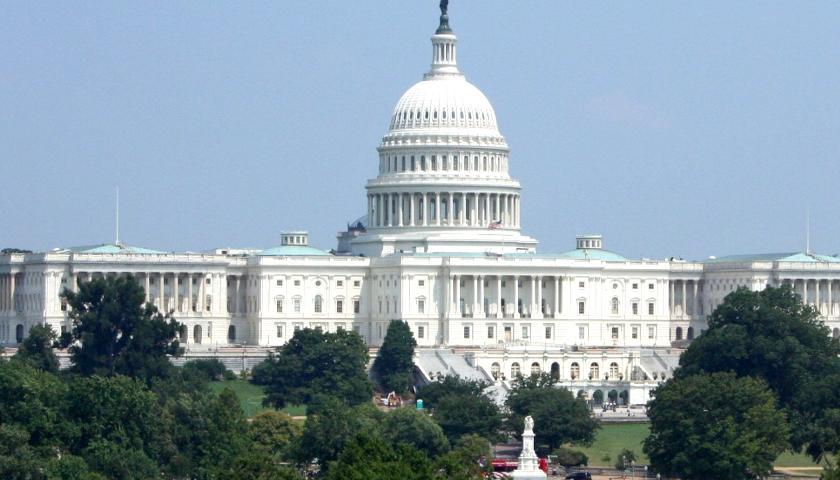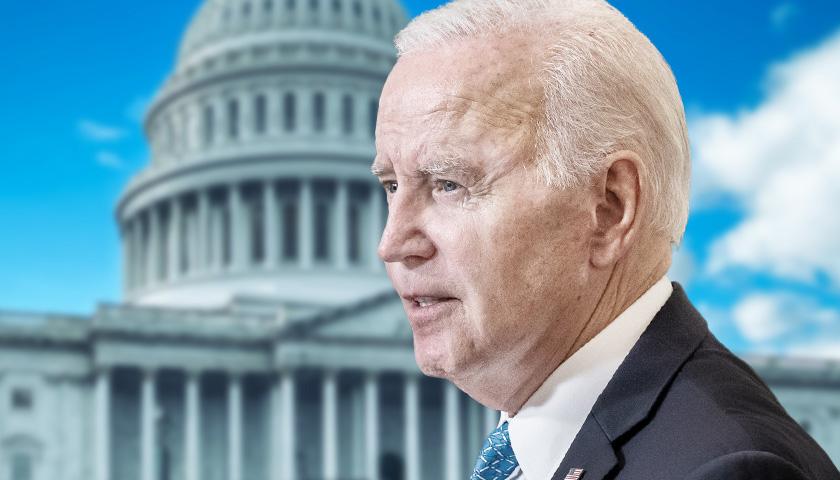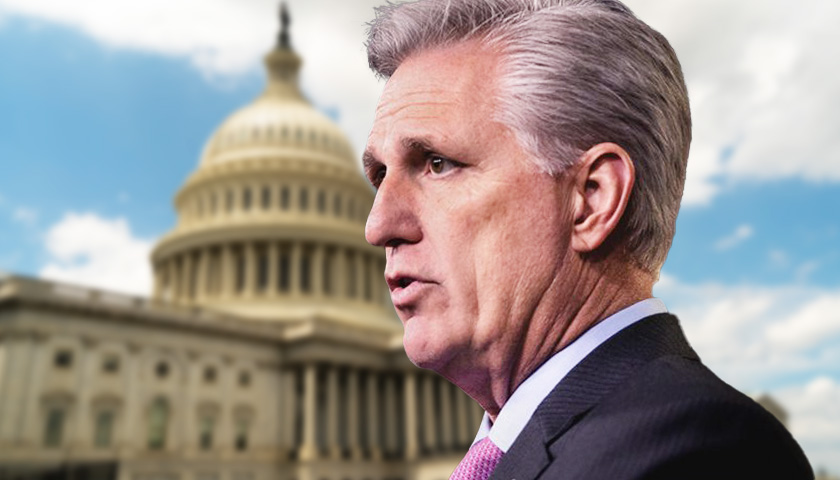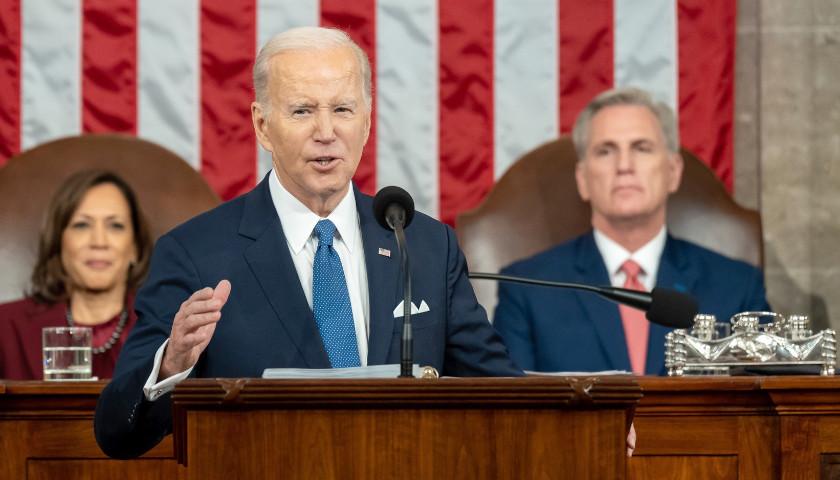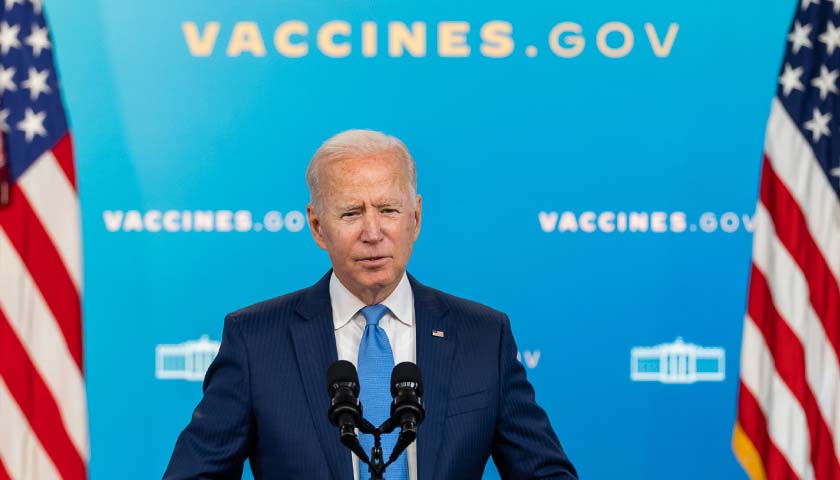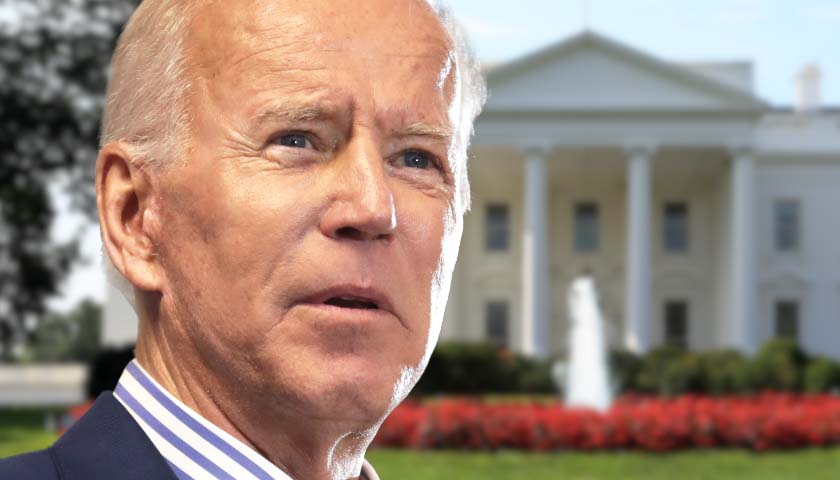The Biden-Harris administration proposed a new rule Tuesday to cover the cost of weight-loss drugs like Ozempic, Wegovy and Mounjaro for millions of Americans.
Read MoreTag: Medicare
Trump Taps Robert F. Kennedy Jr. for HHS Secretary
President-elect Donald Trump on Thursday nominated 2024 Independent presidential candidate Robert F. Kennedy Jr. to lead the Department of Health and Human Services.
Read MoreNew Biden-Harris Medicare Pan Could Cost Taxpayers $20 Billion in Election-Year Giveaway, CBO Warns
In an election-year stunner, the Congressional Budget Office is warning the Biden-Harris administration’s new Medicare prescription drug plan could cost taxpayers more than $20 billion over three years.
The budget analysis arm of Congress said the increased costs are due to the government subsidizing many seniors’ premiums by sending money to insurance firms, and it would cost at least $5 billion extra in 2025 alone and add to the deficit.
Read MoreBiden-Harris Admin on Track to Oversee Massive $1 Trillion in Improper Payments, Watchdog Group Finds
If current trends persist, the Biden-Harris administration will have made over $1 trillion in improper payments by the time President Joe Biden leaves office, according to a report released by the watchdog organization Open The Books on Thursday.
An improper payment is a disbursement “made by the government to the wrong person, in the wrong amount or for the wrong reason,” per federal guidelines. The Biden-Harris administration, between 2021 and 2023, oversaw $801.4 billion in such payments after adjusting for inflation, according to the report.
Read MoreDem Senator Bob Menendez Resigns Following Bribery Conviction
Democratic New Jersey Sen. Bob Menendez resigned his seat in the Senate on Tuesday, according to multiple outlets.
Read MoreAnalysis: Federal Fiscal Burden Consumes 93 Percent of America’s Wealth
Based on data from a U.S. Treasury report, the federal government has amassed $142 trillion in debts, liabilities, and unfunded obligations. This staggering figure equals 93% of all the wealth Americans have accumulated since the nation’s founding, estimated by the Federal Reserve to be $152 trillion.
Unlike other measures of federal red ink that cover an arbitrary period, extend into the infinite future, or ignore government resources, the figure of $142 trillion applies strictly to Americans who are alive right now and includes the government’s commercial assets. Thus, it quantifies the financial burden that today’s Americans are leaving to their children and future generations.
Read MoreCommentary: The Federal Government Loses More Money than Could Ever Be Accounted For
Not long after Jeremy Gober started running a sleep center, he quit treating patients for narcolepsy and sleep apnea and went full-time submitting bogus insurance claims. According to Gober’s 2022 indictment, he committed at least one especially sloppy error: One of his make-believe billings included a Medicare claim for treatment in March 2018 for a patient who’d died in December 2017. Before Gober was caught, Medicare and California’s healthcare system, Medi-Cal, ended up paying him a total of $587,000 for claims that turned out to be fiction.
The payments to Gober were part of $260 million the U.S. Department of Health and Human Services spent from 2009 through 2019 to reimburse healthcare providers in 15 states and Puerto Rico for services to patients who were dead, according to the inspector general of the HHS, which administers Medicare and Medicaid — programs with combined expenditures of $1.7 trillion.
Read MoreCommentary: Rural and Hispanic Communities Among Those Most Benefited by Telehealth
Telehealth has become a health care gamechanger for tens of millions of Americans.
We all know the time and effort an in-person health visit takes – travel to the appointment, time off work, hours spent in an office, follow ups that require us to do the whole process over again. But telehealth expansion in the post-COVID world has changed everything.
Read MoreU.S. Spending on Interest Tops National Defense, Medicare
Congress has spent more money on interest so far this year than it has spent on both national defense and Medicare.
Read MoreCombined Social Security Trust Fund Projected to Deplete Reserves by 2035
Two reports released Monday show that the U.S. combined Social Security trust fund is projected to deplete its reserves by 2035.
The Trustees for Social Security and Medicare released annual reports on Monday. The Trustees projected the Medicare Hospital Insurance trust fund will exhaust its reserves in 2036. The Social Security Old-Age and Survivors Insurance (OASI) trust fund was projected to be insolvent by 2033.
Read MoreWatchdog: Biden’s 2025 Budget Would Drive National Debt to $45 Trillion in 10 Years, 106 Percent of GDP
The Committee for a Responsible Federal Budget (CRFB) a budget watchdog group, found that President Joe Biden’s fiscal year 2025 budget would drive the national debt to $45.1 trillion or 106 percent of the U.S. Gross Domestic Product (GDP) by 2034, from $27.4 trillion or about 97 percent of GDP at the present time.
The organization noted that those calculations are based on the Biden administration’s own internal figures. The current $27.4 trillion debt figure is the debt held by the public, not the total national debt including intragovernmental holdings.
Read MoreCommentary: Congress Should Support Site-Neutral Reforms
The recent Health Equity Report by BlueCross BlueShield of Tennessee offers a glimpse into the health challenges faced by Tennesseans. Among many concerning statistics, one stands out: 100 people are diagnosed with cancer in the state every day.
Sadly, the financial toll of chronic illnesses like cancer is staggering. It can saddle seniors, families and patients across Tennessee with decades of debt. Nationwide, 23 million Americans are confronting the burdensome reality of medical debt, which can wreck credit scores, send seniors to debt collections, and thwart patients from getting the timely, quality care they need.
Read MoreBig Pharma Raises Hundreds of Drug Prices Despite Biden Admin Efforts to Keep Costs Down
Top pharmaceutical companies raised the list price on 775 brand-name drugs in just the first half of January, even as President Joe Biden aims to keep prices low, according to The Wall Street Journal.
The median price hike of the drugs was around 4.5%, with some rising by 10% or more, despite an inflation rate of 3.4% year-over-year in December, according to data from 46brooklyn Research acquired by the WSJ. The price hikes are in contrast to the president’s efforts to tame rising drug prices, taking actions such as imposing automatic rebates to Medicare for drugmakers that raise their prices faster than the price of inflation, which first went into effect in December, affecting 48 drugs covered under Medicare Part B.
Read MoreCommentary: The Left Is Smashing Cultural Third Rails in Pursuit of Their Brave New World Agenda
Readers are familiar with the moniker “third rail.” In political discourse, it refers to those preciously few issues that are so untouchable that the mere talk of change, alteration or revision carries with it what amounts to a political death penalty.
There is general agreement in Washington, D.C., that reform of federal entitlements leads the brief list. The most recent example being the 2011 temporary coalition of former Republican House Speaker Paul Ryan and Democratic Sen. Ron Wyden of Oregon intended to secure a more sustainable Medicare program. Here, all was good and fine for a fast minute before the Democratic Party realized its number one nuclear weapon was in the process of being compromised. And that was that. Suffice to say that that now twelve-year-old effort was the last semi-serious, bipartisan attempt to control entitlement spending we will see for the foreseeable future.
Read MoreAARP Spent Millions Advocating for New Laws That Likely Benefit a Major Corporate Backer
AARP, an organization that represents the interests of retired Americans, spent tens of millions of dollars promoting provisions in the Inflation Reduction Act (IRA) that likely benefit the bottom line of one of the group’s major corporate backers.
AARP spent more than $60 million between 2019 and summer 2022 advocating for a provision that eventually made it into the IRA allowing Medicare to negotiate with pharmaceutical companies over the prices of certain drugs, according to an article posted on the group’s website. The provisions would require the Department of Health and Human Services (HHS) to negotiate the prices of certain drugs with drug manufacturers starting in 2026.
Read MoreCommentary: Voters Will Reject Inflation Reduction Act’s Assault on Medicare
In the last few weeks, House Subcommittees have conducted important hearings on President Joe Biden’s implausibly named “Inflation Reduction Act” and its assault on Medicare.
The law is an assault on Medicare because it violates a core promise of the program – that in exchange for paying a special payroll tax your entire working life, the program will be there for you when you are older.
Read MoreCommentary: Any Debt ‘Default’ Will Be Biden’s Choice
There’s enough revenue to pay interest on the debt even if the $31.4 trillion debt ceiling is reached.
Meaning, if the U.S. defaults on the debt on June 1, it will be because President Joe Biden chose not to make principal and interest payments on U.S. Treasuries out of existing revenue, for which there is more than ample revenues to service and refinance up to the current debt ceiling limit, $31.4 trillion.
Read MoreCommentary: Insane Deficit Spending Is Immoral
In Armageddon, Bruce Willis blows himself up on an asteroid to save his daughter and all of humanity. (Sorry for the spoiler, but the movie is 25 years old.) That theme—parents providing for, and sacrificing for, their children—is the deeply moral and moving story that Americans used to love.
I say “used to,” because something troubling has happened. We now accept that young people should be worse off for a lifetime in order to benefit those who have already lived full, comfortable lives. We saw this during COVID-19, when an elderly leadership class locked children out of classrooms, playgrounds, friendships, and sports, and wiped out jobs, training, and mentorship for young workers.
Read MoreCommentary: The ‘Limit, Save, Grow’ Plan’s Discretionary Spending Caps that Save More than $3 Trillion Might Not Be Enough
House Speaker Kevin McCarthy (R-Calif.) and the House Republican majority have unveiled their spending plan for the next decade, the Limit, Save, Grow Act, that will be tied to a $1.5 trillion increase in the $31.4 trillion national debt ceiling, the centerpiece of which imposes discretionary budget caps beginning in 2024, but which will be set at 2022 levels, which could save more than $3.2 trillion over the next decade, according to an estimate by the Committee for a Responsible Federal Budget.
While an official score still has not come in from the Congressional Budget Office, the proposal stands out as a promise kept on McCarthy’s part to use the must-pass debt ceiling to restore some semblance of fiscal sanity to the out-of-control federal budget and national debt, the latter of which the White House Office of Management and Budget projects will rise to a gargantuan $50.7 trillion by 2033.
Read MoreCommentary: The Interest Alone on the National Debt Will Hit $1 Trillion in 2024 as Reserve Currency Status Is Questioned
Gross interest owed on the $31.4 trillion national debt — that is, interest owed on both the $24.9 trillion publicly traded debt and the $6.7 trillion debt in the Social Security, Medicare and other trust funds — will reach a gargantuan $1 trillion in 2024 for the first time in American history, according to the latest data gathered by the White House Office of Management and budget.
To put that into perspective, that is more than is spent on national defense related spending, currently $814 billion.
Read MoreRepublicans Say Biden Lied About Their Position on Social Security, Medicare to Scare Seniors
Congresswoman Marjorie Taylor Greene wasn’t alone Tuesday night in openly arguing President Biden in his State of the Union address misstated House Republicans’ position on the future of Medicare and Social Security. “I think, because he lied, it was a frustration,” Kentucky GOP Rep. Thomas Massie told Just the News after Biden’s roughly 72-minute address.
Read MoreCommentary: Income Inequality in America Is an Engineered Myth
The federal government significantly and intentionally misreports income distribution, sparking bad policies and political divisions.
That’s the argument former senator Phil Gramm and two other economists, Robert Ekelund and John Early, lay out in their compelling and essential new book, “The Myth of American Inequality: How Government Biases Policy Debate.”
Read MoreCommentary: Expanding Access to Alzheimer’s Treatment
Promising new medicines could soon be available to help patients fend against this disease. Government must ensure Medicare is able to cover them.
Approximately six million Americans are living with some form of Alzheimer’s, a number poised to double over the coming decades. Citizens are living 30 years longer than a century ago, primarily due to incredible advances in the field of medicine. Future opportunities are limitless if we foster an environment that rewards rather than discourages innovation. Unfortunately, that’s not what our leaders in Washington are doing.
Read MoreTop 10 Tough Votes Democrats Had to Take During Vote-a-Rama for Massive Spending Bill
During a “vote-a-rama” on their $739 billion reconciliation spending bill that has hundreds of billions for climate and health care programs, Democratic senators had to take a series of uncomfortable votes on hot-button issues — particularly tough for those representing swing states.
The bill, which also includes federal funding for 87,000 new IRS agents, passed on a party line vote 51-50 with Vice President Kamala Harris breaking the tie.
Read MoreCommentary: Reducing Patient Access to New Medications Is Progressives’ Latest Medicare Price Fixing Scheme
As negotiations on their tax and spending bill continue, Senate Democrats are working on a legislative proposal to have the government fix the prices of Medicare prescription medications. Though the details of the 190-page amendment differ in certain respects from earlier versions, the indisputable result would be the same: Reduced patient access to prescription drugs.
Like most giant regulatory schemes, the draft proposal is characteristically complex with numerous provisions, including detailed data collection, new mandates, tax penalties on drug manufacturers, free vaccines, and a cap on out-of-pocket costs. But the heart of the bill is the creation of a Drug Price Negotiation Program administered by the Secretary of the U.S. Department of Health and Human Services (HHS).
Read MorePostal Service Legislative ‘Fix’ Will Dump Workers on Medicare
A bill to “fix” the troubled United States Post Office (USPS) is on the verge of passage in the Senate but does it solve more problems than it creates? The Postal Service Reform Act of 2021, H.R. 3076 was scheduled for a vote earlier this month but was blocked by Senator Rick Scott (R-Florida) on a procedural technicality. “We can’t afford to add stress on our already enormous national debt with poor financial planning, which I think this bill absolutely does,” Scott said of the bill.
Now it’s back and on track for a vote in the Senate.
The biggest financial liability facing the USPS is the legal requirement to fund 75 years of retirement health benefits in advance for its workers. Congress has found a way around that by dumping the future postal workers on to Medicare.
Read MoreSixteen States File New Lawsuit Against Federal COVID Vaccination Mandate
Sixteen states again are challenging a federal COVID-19 vaccination mandate for health care workers who work at facilities that receive Medicare and Medicaid funding.
Friday’s filing in U.S. District Court for the Western District of Louisiana comes after the issuance of final guidance on the mandate from the U.S. Centers for Medicare & Medicaid (CMS), arguing the guidance is an action that is reviewable.
The U.S. Supreme Court ruled by 5-4 vote Jan. 13 against the original Louisiana challenge to the mandate and a similar Missouri filing.
Read MoreCommentary: Biden Needs to Decide If COVID Is Still a ‘National Emergency’
The omicron variant may be nearing its peak in some states, but across the country it’s produced a dizzying array of conflicting signals on whether the nation should remain under a COVID national emergency or move on to an endemic “new normal.”
Comedian Bill Maher’s “I don’t want to live in your mask-paranoid world anymore” monologue went viral last week, just days after the Atlantic, the standard-bearer journal for the liberal intelligentsia, ran a story headlined: “COVID Parenting Has Passed the Point of Absurdity.” Accompanying the article was a black-and-white photo of a woman frozen in a more desperate and primal state of panic than the subject of Edvard Munch’s “The Scream.”
Omicron, for most people without co-morbidities, produces much milder symptoms than do the coronavirus’s previous variants, but it’s far more infectious, racing through schools, shutting down classrooms and forcing parents to consult their district’s ever-shifting COVID “decision trees” on a seemingly daily basis.
Read MoreLiberal Supreme Court Justices Show Weak Grasp of Basic COVID-19 Facts
The liberal justices on the Supreme Court demonstrated a stunningly weak grasp of basic facts concerning the COVID-19 pandemic Friday, as they defended the Biden regime’s policies during oral arguments over vaccine mandates in the workplace.
The court heard separate oral arguments over federal vaccine mandates for employers with more than 100 employees, and for health care workers at facilities receiving Medicaid and Medicare funding.
Justice Stephen Breyer at one point seemed to suggest outrageously that the OSHA mandate would prevent 100 percent of daily US COVID cases. It is common knowledge now that the vaccinated people can still spread the disease.
Read MoreFacing Labor Shortages, Several Large Hospital Systems Drop Vaccine Mandates
Several large U.S. hospital systems have dropped their COVID-19 vaccine requirements for employees in the wake of a U.S. district court’s temporary halt of the Biden regime’s vaccine mandate for healthcare workers.
After months of protests, the mandate forced thousands of hospital employees to either resign, or be terminated because of their refusal to get vaccinated.
Louisiana-based federal Judge Terry Doughty issued a preliminary injunction on November 30, blocking the federal government from mandating the experimental injections for workers at Medicare or Medicaid-funded healthcare facilities in 40 states.
Read MoreLawsuits Challenging Biden’s Vaccine Mandates Mount, Likely Heading to U.S. Supreme Court
Multiple lawsuits have been filed against the Biden administration over three different vaccine mandates targeting private employees, federal employees and healthcare workers serving Medicare and Medicaid patients.
But lawsuits filed by 27 states over the private sector mandate is setting the stage for the U.S. Supreme Court to weigh in because they were filed directly in five federal courts of appeals.
Read MoreActivists Confront Kyrsten Sinema in Airport, on Plane over Biden Agenda
Protesters and activists followed Arizona Sen. Kyrsten Sinema through Reagan National Airport in Washington, D.C. and onto a plane Monday, pressing her on why she refuses to back parts of the $3.5 trillion reconciliation bill.
“I’m just trying to get an explanation for the American people,” Kunoor Ojha, chief of staff of the Green New Deal Network, asked Sinema as she followed the senator through the airport, video of the encounter shows.
Read MoreCommentary: After Disastrous September and 2022 Midterms Looming, Biden May Have Lost His Mandate to Govern
Following a catastrophic U.S. military withdrawal from Afghanistan, the highest inflation since 2008,pushing unpopular COVID vaccine mandates, rationing COVID treatments to red states and finally, watching his domestic legislative agenda falter in Congress, President Joe Biden is already upside down on his job approval ratings, according to the latest average of polls compiled by RealClearPolitics.com.
Reuters/Ipsos on Sept. 29-30 had Biden’s approval at 46 percent and disapproval at 50 percent.
Read MoreCommentary: BidenCare Blows ObamaCare Costs Out of the Water
PolitiFact’s 2013 “Lie of the Year” came from former President Barack Obama selling ObamaCare, his massive government takeover of healthcare. “If you like your healthcare plan, you can keep it,” Obama said. That was a lie. Now President Biden and Sen. Bernie Sanders (I-Vt.) want to expand that lie through their $3.5 trillion federal spending blowout pending in Congress.
Obama also said we could keep our doctors under ObamaCare. Obama lied to me and millions of other people. When I left a full-time job in 2013 for contract work, I switched to an ObamaCare exchange plan. And no, I didn’t get to keep my doctor on that new plan. I also saw the cost of my ObamaCare plan increase by double digit rates for 2014.
Read MoreReport: U.S. National Debt Closer to $123 Trillion, Nearly $796,000 Per Household
The U.S. national debt is closer to $123 trillion, more than four times what the Treasury Department is reporting, Chicago-based Truth in Accounting calculates in its new annual analysis of the nation’s finances.
The federal government has $5.95 trillion in assets and $129.06 trillion worth of bills resulting in a $123.11 trillion shortfall, or a debt burden of $796,000 per U.S. household.
Because of this massive amount of debt and repeatedly poor financial decisions made by lawmakers, TIA gave the U.S. government an “F” grade for its financial condition.
Read MoreTrump Administration to Announce Medicare, Medicaid Will Cover Eventual COVID-19 Vaccine According to Report
The Trump administration is expected to announce that the eventual coronavirus vaccine will be covered by Medicare and Medicaid, Politico reported late Monday.
The administration is expected to change a rule that previously prevented Medicare and Medicaid from covering vaccines that received emergency use authorization from the FDA. The official announcement is expected from the Center for Medicare and Medicaid Services (CMS) Tuesday or Wednesday, according to Politico.
Read MoreCommentary: Lowering the Cost of Prescription Medicines for Seniors Is Not Impossible
Earlier this year James Payne, a 73-year-old retired attorney in Utah, was so fed up with the high cost of a blood thinner medication he takes, he researched prices in Canada, where he found it was cheaper.
“Under Medicare, I am now paying $225 for a three-month supply,” Payne explained. “That’s $25 more than I was paying last year. Under my employer’s insurance I was only paying $20.” Payne says he is not sure why the costs are so much higher and continue to climb under Medicare, but he thinks there must be ways to make life-saving medications more affordable.
Read MoreMedicare to Ratchet up Enforcement Against Nursing Homes as Coronavirus Fatalities Exceed 25,000
The Centers for Medicare and Medicaid Services (CMS) unveiled enhanced enforcement actions on Monday against nursing homes after preliminary federal data shows that at least 25,923 nursing home residents across the country have died from coronavirus.
“This data, and anecdotal reports across the country, clearly show that nursing homes have been devastated by the virus,” CMS Administrator Seema Verma and Centers for Disease Control Director Robert Redfield wrote in a letter to U.S. governors on Sunday.
Read MorePeters and Stabenow Ask Trump to Reopen Health Insurance Enrollment Amid Coronavirus Outbreak
Michigan’s U.S. senators sent a letter to the Trump administration Friday requesting a special health insurance enrollment window in response the coronavirus outbreak.
Read MoreReport: Medicaid Spending Skyrockets, Consumes 30 Percent of State Budgets
In 2015, when Medicare and Medicaid turned 50, Investors Business Daily pointed out that one was going bankrupt (Medicare), the other was bankrupting states (Medicaid).
Read MoreTrump Woos Seniors With Order to Boost Medicare Health Program
THE VILLAGES, FLORIDA – U.S. President Donald Trump sought to woo seniors on Thursday with an executive order aimed at strengthening the Medicare health program by reducing regulations, curbing fraud, and providing faster access to new medical devices and therapies.
Read More








